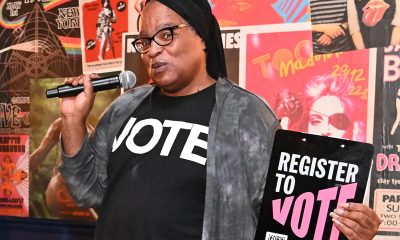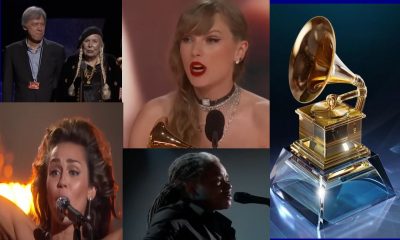Music & Concerts
Washington Chorus forges ahead amid pandemic
New livestream productions planned for fall
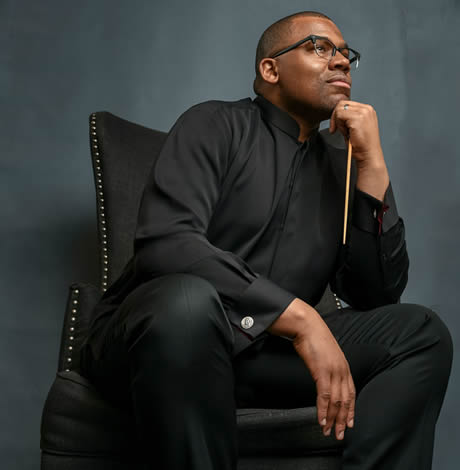
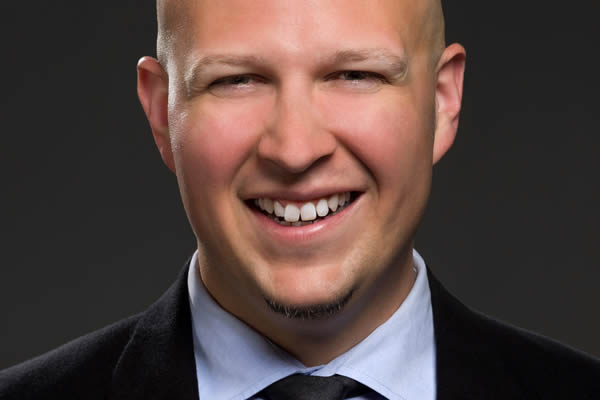
Unlike many arts organizations that have opted to sit out the pandemic, The Washington Chorus (TWC), the DMV’s only two-time Grammy Award-winning choral ensemble, is seizing the moment to create innovative work and remain connected to their audience.
From his home in Arlington, TWC’s executive director Stephen Marc Beaudoin explains how the upcoming season has unfolded: “After our new artistic director Dr. Eugene Rogers came on board in February, TWC quickly began developing a new season on the assumption of being able to produce live concerts. But then COVID-19 slapped us upside the head. By mid-March the concert at the Strathmore in Maryland was abruptly cancelled, and things changed dramatically.”
Together, Beaudoin and Rogers (TWC’s first African-American conductor) quickly concluded that closures would not be short lived. “We discussed whether we do something, or take a seat,” says Beaudoin, who is gay. “Many choruses decided not to do much of anything during this time beyond sharing archival stuff. Following Dr. Rogers’ lead, we decided to continue making art and expand access to what we do.”
After innumerable calls and texts between Beaudoin and Rogers, who is based in Michigan where he is also director of choral activities at the University of Michigan, the pair moved forward implementing the upcoming season, TWC’s 60th. The first big event is “Cantata for a More Hopeful Tomorrow” (Saturday, Nov. 14, 7:30 p.m.), a live-streamed world premiere commissioned work by composer Damien Geter and filmmaker Bob Berg. It the tells the story of one individual’s journey as he grapples with recovery from COVID-19.
Following “Cantata” is TWC’s annual beloved “A Candlelight Christmas” (Friday, Dec. 18, 7:30 p.m.), a live-streamed online performance featuring about a dozen singers distanced on the Strathmore stage.
Comprised of 170 singers, the chorus presents many traditions, styles, and composers, ranging from Brahms’ Requiem to Carmina Burana to the holiday pops with the National Symphony to a concert of St. Patrick’s Day music to singing at the Kennedy Center honors for composer Philip Glass a year and a half ago.
As the chorus’ executive director, Beaudoin bears the responsibility of business. It’s up to Beaudoin to meet and exceed revenue for concerts, to collect individual contributions and grants, organize special events, and ensure that TWC grows and retains a talented staff. He’s also responsible to manage and motivate the board of directors. And because he’s a musician and trained singer, he likes to collaborate on the chorus’ artistic vision. Beaudoin says, “I’m a creative individual first, last, and always, and as such I like to be a supporter and partner to the artistic director and production and the artistic side of things at the end the day our job is to create art and foster community.”
TWC’s acclaimed conductor Dr. Rogers was a unanimous choice after a long search for a new artistic director.
While TWC didn’t set out specifically to find a person of color to fill the position, they wanted to open the opportunity to everyone who was qualified: “We didn’t begin with the idea to cast a particular color or gender in this role but we did set out very intentionally to center equity and inclusion in the search and in the process, we had a terrifically diverse candidate pool. Over 40% were women and/or folks of color. We wanted to talk to the best of the best, and we did.”
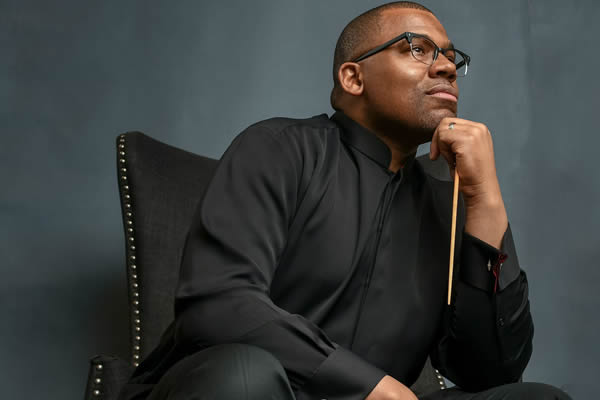
Prior to his role with TWC, Beaudoin served as executive director of the Maryland Symphony Orchestra in Hagerstown, Md. He describes his arrival at TWC as a bit of kismet. A talented singer, Beaudoin had stepped away from singing for a while, but after a vacation to Amsterdam where he experienced a thrilling musical festival along the canals, he wanted to reconnect with music. When he returned home, he successfully auditioned with The Washington Chorus. Soon after, while seated next to a fellow tenor at rehearsal, he learned that TWC was looking for an executive director. He subsequently applied and was hired.
Working at home with his partner of five years Joe, an employee at the Defense Department, he finds things very manageable. The couple enjoys cooking and spending time with their beloved Sheltie Tessa and watching some TV, especially “Love on the Spectrum,” a four-part documentary series following young adults on the autism spectrum as they explore the unpredictable world of love, dating and relationships. All things considered, it hasn’t been too bad, says Beaudoin.
Still, things are tough professionally. Looking forward, he thinks perhaps venues might reopen next summer. In the meantime, the show goes on.
“What’s most challenging is we have to think differently about production. It’s hard to continue to foster a sense of community when we’re all at home for the most part. It’s hard financially – we’re used to clearing a good amount of money from our big concerts. And how many of those people will come to see digital livestream and pay $10 or $15 online? If 10,000 people from around the world pay to watch online, that would be great, or maybe it will just be 100 people? We just don’t know.”
Even with support from D.C. Commission on the Arts and Humanities, and some funding from U.S. Commission of Fine Arts, it isn’t easy, he says. “Still, with whatever challenges we’re facing, we know it pales in comparison to the challenges faced by families who have lost loved ones or are suffering financial hardship. And we acknowledge that the pandemic is disproportionately affecting people of color.
“Hopefully, through a lens of inclusive excellence and storytelling, we can help. We think brining new work to music lovers is the most important thing we can be doing this fall.”
Music & Concerts
Washington chorale kicks off Christmas with vibrant program
‘Thine Own Sweet Light’ concerts planned

The full Washington Master Chorale will return for its annual holiday concert tradition with “Thine Own Sweet Light” on Friday, Dec. 19 and Sunday, Dec. 21 at St. Ann’s Catholic Church (D.C.) and Church of the Epiphany (D.C.).
The concert will feature the rich sounds of the 50-voice, a cappella chorus performing lush, seasonal choral music inspired by the theme of light. Highlights include Edvard Grieg’s “Ave Maris Stella,” Eric Whitacre’s “Lux Aurumque,” and Christopher Hoh’s “Holy, Holy, Holy is the Lord God of Hosts.” The program will also present a new work by Barcelona composer Josep Ollé i Sabaté, along with charming holiday folk songs and seasonal favorites.
For more details, visit the Washington Master Chorale website.
Music & Concerts
Queer mega stars (and allies) ready to take D.C. stages this fall
Watch LGBTQ icons light up stages across the DMV as they sing, dance, and drag their way through spectacular shows.

One of the best ways to welcome fall is by catching LGBTQ performers (and their allies) lighting up some of the D.C. area’s biggest stages. From country and pop to drag and rock, the season is packed with shows you won’t want to miss.
Maren Morris – The country, rock, and pop diva—known for hits like “The Bones” and for standing up against Nashville’s anti-LGBTQ voices—takes the stage at Wolf Trap (1551 Trap Rd, Vienna, Va.) on Friday, Sept. 12 at 8 p.m. Tickets start at $64.
RuPaul – The mother of modern drag and host of “RuPaul’s Drag Race” will spin a DJ set at Echostage (2135 Queens Chapel Rd NE) in Northeast D.C. on Sept. 20. Before RuPaul swaps wigs for headphones, Trade and Number 9 owner Ed Bailey will warm up the decks. For tickets and details visit echostage.com.
Conan Gray – The queer pop prince, celebrated for his Gen Z anthems like “Heather” and “Maniac,” brings his Wishbone Pajama Show to EagleBank Arena in Fairfax, VA, (4500 Patriot Cir) on Sept. 20 at 8 p.m. Tickets start at $113. For more info visit shop.conangray.com/pages/tour.
All Things Go Music Festival – With a lineup that includes Noah Kahan, Lucy Dacus, Kesha, Clairo, Doechii, and more, the beloved LGBTQ-friendly festival takes over Merriweather Post Pavilion (10475 Little Patuxent Pkwy, Columbia, Md.) Sept. 26–28. For tickets and details visit allthingsgofestival.com.
BERTHA: Grateful Drag – This unique tribute brings drag artistry and the sounds of the Grateful Dead to The Atlantis (2047 9th St NW) on Sept. 27. Tickets start at $47 at theatlantis.com.
Peach PRC – Rising Australian pop star and out lesbian, whose confessional tracks like “Perfect for You” and “Forever Drunk” have made her a queer TikTok darling, performs at The Atlantis on Sept. 29 at 6:30 p.m. The show is general admission only. Additional details are on theatlantis.com.
Addison Rae – The TikTok star-turned-pop princess, who’s crossed over into music with glossy hits like “Diet Pepsi” brings her sold out show to The Anthem (901 Wharf St., S.W.) on Sept. 30. Tickets are sold out, but resale options start around $80. For more info visit theanthemdc.com.
The Rocky Horror Picture Show 50th Anniversary – Celebrate the cult classic that’s been a queer midnight-movie staple for decades, with Barry Bostwick (a.k.a. Brad Majors) at the Warner Theatre (513 13th St., N.W.) on Oct. 2 at 8 p.m. Tickets start at $41 via Ticketmaster.
Chaka Khan, Patti LaBelle, Gladys Knight & Stephanie Mills – Four legends, one stage. Between Khan’s funk, LaBelle’s soul, Knight’s R&B, and Mills’ powerhouse vocals, this concert at Capital One Arena (601 F St NW) on Oct. 3 at 8 p.m. promises pure diva magic. Tickets start at $103. For more details visit capitalonearena.com.
Lorde – Joined by The Japanese House and Chanel Beads, the Grammy-winning New Zealand singer-songwriter behind “Royals” and “Solar Power” returns to The Anthem on Oct. 4 at 7 p.m. Lorde has long been embraced by queer fans for her dreamy pop and subversive lyrics. For more info visit theanthemdc.com.
Andy Bell (of Erasure) – The British queer rock icon, best known for synth-pop classics like “A Little Respect” and “Chains of Love,” brings his Ten Crowns Tour to the Lincoln Theatre (1215 U St., N.W.) on Friday, Oct. 17 at 8 p.m. Tickets are $90.45.
Doechii – The self-described queer “Swamp Princess”—and WorldPride 2025 headliner—continues her breakout year with the Live from the Swamp Tour at The Anthem on Oct. 21 at 8 p.m. Known for blending rap, R&B, and avant-garde performance art, Doechii is one to watch. Tickets start at $153.
Neon Trees – The out-and-proud Utah rockers behind “Everybody Talks” and “Animal” perform at the Lincoln Theatre on Friday, Oct. 24 at 8 p.m. Lead singer Tyler Glenn, who came out publicly in 2014, has become a strong queer voice in alternative rock. For tickets and info visit impconcerts.com.
Sasha Colby – The “RuPaul’s Drag Race” Season 15 winner strips down on the Stripped II Tour at the Warner Theatre on Nov. 2 at 8 p.m. Tickets available now on Ticketmaster.
Lola Young – The bisexual indie-pop sensation, whose raw songwriting has earned her millions of TikTok fans and multiple chart soaring hits visits The Anthem on Nov. 9 at 8 p.m. Tickets are still available.
Opera Lafayette
Featuring Mary Elizabeth Williams as Dido
+ Elijah McCormack, Chelsea Helm
Oct. 16, 7:30 p.m.
Sixth & I
PostClassical Ensemble
The Pale Blue Do: A Musical Voyage Inspired By Nature
Featuring National Geographic’s Enric Sala, Guest Curator
Wednesday, November 19, 7:30 p.m.
Terrace Theater
Washington Concert Opera
Starring Kate Lindsey, Theo Hoffman, John Moore, and Fran Daniel Laucerica
Nov. 23, 6 p.m.
Lisner Auditorium
Washington Master Chorale
An intimate a capella concert taking place in an architectural jewel, featuring cherished choral gems from Anglican and Catholic tradition and early American hymns. The concert will also present the world premiere of Christopher Hoh’s Holy, Holy, Holy is the Lord God of Hosts, and hymn singing featuring Robert Church, organist and choirmaster at St David’s.
Oct. 18, 7:30 p.m.
October 19, 5 p.m.
St. David’s Episcopal Church
Music & Concerts
Cyndi Lauper ready to have fun in Virginia
Superstar to bring final leg of farewell tour to Jiffy Lube Live
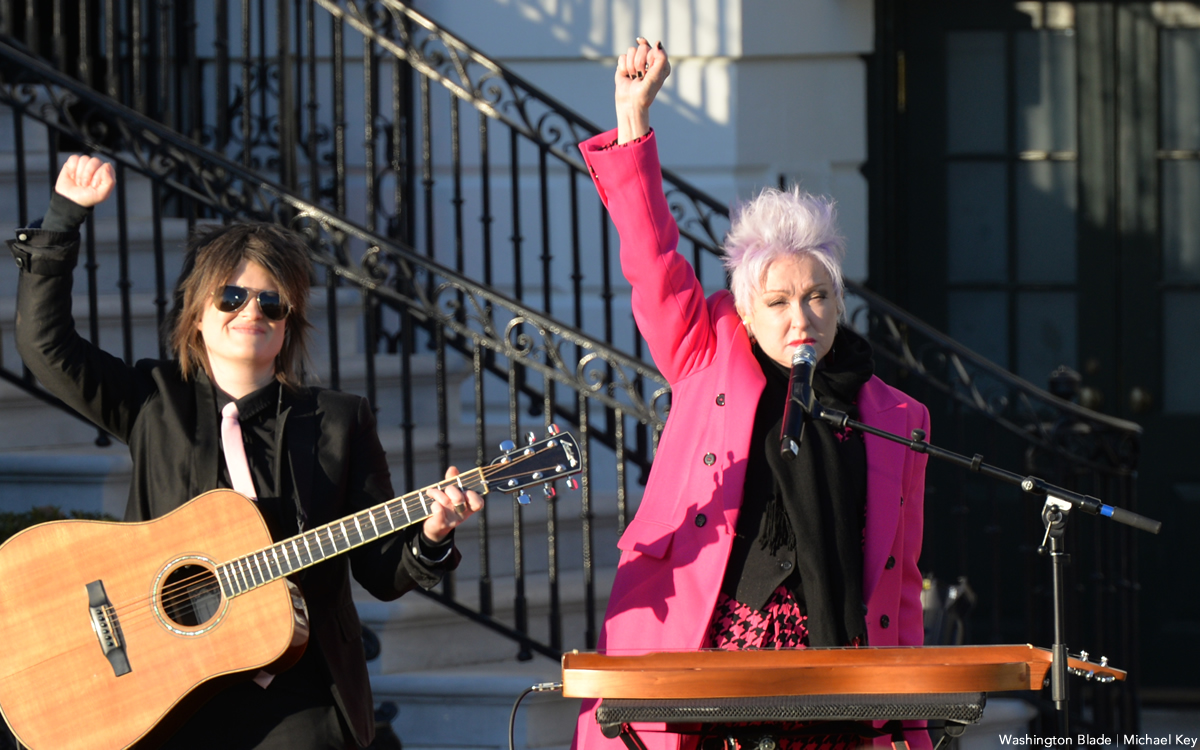
Superstar Cyndi Lauper will bring the final leg of her farewell tour “Girls Just Wanna Have Fun” to Bristow, Va., on Thursday, July 24 at Jiffy Lube Live.
Lauper’s international Farewell Tour – her first major headlining run in a decade – kicked off in North America last October, and included her first time ever headlining (and selling out) Madison Square Garden. Lauper’s performances have earned raves from the New York Times, Rolling Stone, Billboard, and many more, and surprise guests have included Chaka Khan, Sam Smith, and Hayley Williams. The tour just visited the U.K. and Europe, and will head to Australia and Japan in April.
Tickets are available on Live Nation’s website.

